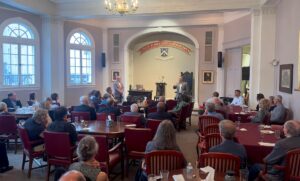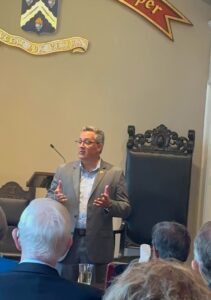Cincinnati, OH – What a fun and quite unique night! Our November 12 dinner event and gathering at The Literary Club downtown – https://fplcohio.org/events/contemporary-espionage – saw a packed house for a presentation that truly stood out and reinforced the high standard for our organization’s speaker series. The event’s subject was not just timely, but quite uniquely captivating and relevant for today’s rapidly changing world.
“Challenges in Contemporary Espionage”
Our guest speaker, Mr. Jeremy Hurewitz, brought firsthand experience and a wealth of insights to the discussion. Regrettably, his flight from New York City was canceled due to the government shutdown, preventing him from attending in person. Despite this setback, we managed to connect via video call, ensuring the success of the event.

As an accomplished journalist, respected analyst, and trusted advisor to leading intelligence and corporate security bodies he shared rare and fascinating insights from years spent at the intersection of international affairs, high-stakes intelligence gathering, and global security analysis. From Prague and Shanghai to executive protection operations, his stories wove together the human and technological aspects of modern espionage.
His presentation brought to light the complexities and incredible advancement of modern Chinese espionage and its innovative tools and tactics, revealing the critical, sometimes confounding, challenges it presents for American and the rest of multinational defense and security experts. The talk went far beyond headlines, offering a detailed look at how current global actors and organizations operate in today’s intelligence environment and the great challenges the people in the field go through to counteract the advent of full body recognition and movement, and not just only the facial part. The Q&A session afterward was very engaging and lively, a testament to the presentation’s success in sparking curiosity and dialogue.

For those of you unable to attend, we don’t want you to miss out on Jeremy Hurewitz’s fascinating work. We recommend watching his recent video interview, “What Spies Can Teach Us About Persuasion”, via GZERO Media. In the video, Jeremy breaks down why true intelligence pros are more like master persuaders than action heroes and how these ‘spy skills’ have lessons for us all, from the conference room to the negotiating table. Get your own taste of the inspiration and practical insight he brought to our event!
For all interested parties, we’d like to mention that our organization has purchased a few books that we would be happy to offer at cost. All proceeds are tax-deductible and are used to support the organization and fund our future events. Please send us an email message should you be interested in purchasing your own copy.
Thank you all who came for making this event such a success! Stay tuned for more exceptional programming from FPLC in the new year, and remember, you never know what you’ll discover when you join us for nights like these!

 Author, speaker, and analyst Jeremy Hurewitz is a former freelance journalist with more than a decade experience based in Prague and Shanghai. He built and ran Project Syndicate, an international newspaper association.
Author, speaker, and analyst Jeremy Hurewitz is a former freelance journalist with more than a decade experience based in Prague and Shanghai. He built and ran Project Syndicate, an international newspaper association. From its opening moments, the event carried significance that went beyond its agenda. Gathering on September 11, a date etched into the American memory, heightened the feeling that the subject matter was not academic abstraction, but part of a larger, urgent conversation about security, resilience, and responsibility.
From its opening moments, the event carried significance that went beyond its agenda. Gathering on September 11, a date etched into the American memory, heightened the feeling that the subject matter was not academic abstraction, but part of a larger, urgent conversation about security, resilience, and responsibility. Several elements combined to make the evening truly exceptional. Dr. Harknett’s remarkable depth of expertise brought an uncommon level of insight. He translated complex cyber-strategy concepts into clear, actionable ideas, leaving attendees with both new knowledge and practical ways to think about cybersecurity in their own lives and work. Equally striking was the relevance of his topic. By linking high-level geopolitical cyber warfare to more local concerns such as infrastructure vulnerabilities, cybercrime, and threats to personal data, Dr. Harknett made the global conversation immediately applicable to everyone in the room.
Several elements combined to make the evening truly exceptional. Dr. Harknett’s remarkable depth of expertise brought an uncommon level of insight. He translated complex cyber-strategy concepts into clear, actionable ideas, leaving attendees with both new knowledge and practical ways to think about cybersecurity in their own lives and work. Equally striking was the relevance of his topic. By linking high-level geopolitical cyber warfare to more local concerns such as infrastructure vulnerabilities, cybercrime, and threats to personal data, Dr. Harknett made the global conversation immediately applicable to everyone in the room. Wendy Cutler is Vice President at the Asia Society Policy Institute (ASPI) and the managing director of the Washington, D.C. office. In these roles, she focuses on building ASPI’s presence in the nation’s capital and on leading initiatives that address challenges related to trade, investment and innovation, as well as women’s empowerment in Asia.
Wendy Cutler is Vice President at the Asia Society Policy Institute (ASPI) and the managing director of the Washington, D.C. office. In these roles, she focuses on building ASPI’s presence in the nation’s capital and on leading initiatives that address challenges related to trade, investment and innovation, as well as women’s empowerment in Asia.